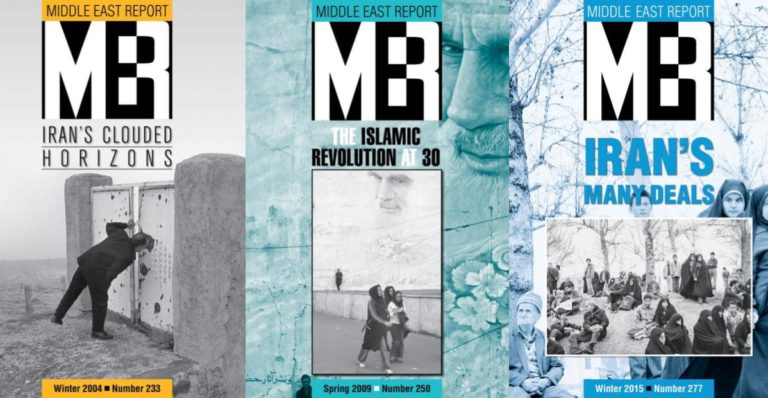
Rethinking US Policy Toward Iran: A Forum, Middle East Report 294 (Spring 2020)
Any effort to imagine new paths for US policy would have to redefine US relations with Iran and the roles both play in the region. To discuss the current context and future possibilities, Middle East Report reached out to seven scholars and policy analysts for their thoughts on some critical questions.
Vahid Abedini and Razieh Armin, “The Making of a ‘Resistance Parliament’ in Iran and the Challenges Ahead,” Middle East Report Online, March 5, 2020
Last year’s parliamentary elections yielded a particularly conservative legislature, at a time when multiple domestic and regional crises seemed to be coming to a head. This piece examines Iran’s elections, parliament and the political landscape in the Islamic Republic.
“The recent elections highlight how the Iranian regime’s usual tactic of muddling through crisis is insufficient to maintain domestic support. Electoral politics is delivering an increasingly hardened and narrowly conservative political elite that may be more uniformly opposed to engaging with the United States.”
Arang Keshavarzian, “The Iran Deal as Social Contract,” Middle East Report 277 (Winter 2015)
The Iran Nuclear Deal (Joint Comprehensive Plan of Action or JCPOA) emerged in 2015 and persists despite the US withdrawal under the Donald Trump administration. But now the Joe Biden administration is looking to reestablish the deal, changing regional dynamics yet again. Here, Arang Keshavarzian examines what the deal means for Iran’s economy and politics.
“At least since the contested 2009 presidential election, it appears, a growing number of the regime’s decision makers, including confidants of the Leader and now President Rouhani, too, have hoped to build a new political economy that will secure the compliance of Iranian citizens, if not their active support. Social contracts are always partial, and come with peril as well as promise for all involved. But, as it enters its thirty-eighth year, the Islamic Republic is employing the nuclear deal as part of a gambit to achieve a new one.”
Iranian Elections
Naghmeh Sohrabi and Arang Keshavarzian, “Lessons Learned (and Ignored): Iran’s 2017 Election in Context,” Middle East Report Online, May 26, 2017
The last presidential elections offered new lessons, but are they applicable in 2021 and will they be ignored?
“[T]he political elite and the population learn lessons from each election and apply them to the next one—from the how and why of “election engineering” (various forms of fixing or tampering with the vote) to the building of coalitions among former enemies to impassioned arguments among citizens about whether to vote. These lessons are distinct each time.”
Kevan Harris, “An ‘Electoral Uprising’ in Iran,” Middle East Report Online, July 19, 2013
The 2013 electoral campaign began as tightly contested between eight candidates but ended with a landslide victory for Hassan Rouhani. Kevan Harris explains the late political shifts that led to Rouhani’s presidency.
“Yet as another presidential election approached, the three-decade political improvisation called the Islamic Republic once again went off script.”
Kaveh Ehsani, Norma Claire Moruzzi and Arang Keshavarzian, “Tehran, June 2009,” Middle East Report Online, June 28, 2009
Mahmoud Ahmadinejad, the sitting president, had received 64 percent of the vote to 34 percent for his main challenger, Mir Hossein Mousavi. But many Iranians rejected the government-stated results as ludicrous and took to the streets in what became known as the Green Revolution. Here, the authors examine the origins and outcome of one of Iran’s most controversial elections.
“For many Iranians, the dispute over this ‘result’ is not simply about the outcome—Ahmadinejad’s anointment as president—but about the basic election procedures and laws that were violated.”
Bernard Hourcade, “In the Heart of Iran: The Electorate of Mahmoud Ahmadinejad,” Middle East Report 241 (Winter 2006)
In this article, Bernard Hourcade examines how the controversial President Ahmadinejad came to power and decisively defeated the more well-known establishment candidate, Ali Akbar Hashemi Rafsanjani. A key issue, he finds, is with the electoral base itself.
“Unlike other candidates, who campaigned among the intelligentsia, who do not vote, Ahmadinejad understood that political victory comes through popular appeal. While other candidates controlled the state apparatus, he took pains to reinforce his local networks and to provide himself with a social, but also geographic, electoral base.”
Naghmeh Sohrabi and Arang Keshavarzian, “On the Eve of Iran’s Presidential Elections,” Middle East Report Online, June 7, 2001
The 2001 election saw the not-surprising re-election of President Mohammed Khatemi, but as this article makes clear, significant changes were happening within Iranian elections, discourse and public participation—even in an election in which the outcome seemed certain.
“But the electoral campaign cannot be reduced to official speeches, newspaper articles and polling data. Its significance stems from the critical space opened up by the numerous public exchanges between political orators and pundits and their audiences.”
